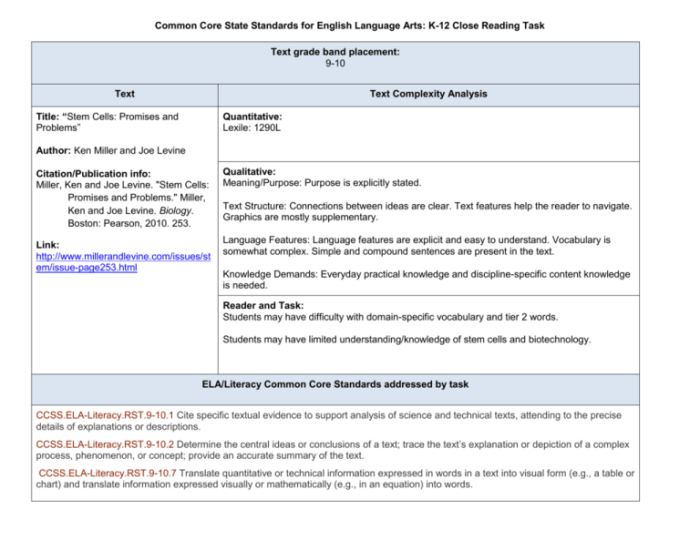Embark on a captivating journey into the realm of stem cell research with our comprehensive Stem Cell Webquest Answer Key. This key unlocks a treasure trove of knowledge, providing clarity and understanding to the complex world of stem cells and their revolutionary applications in medicine.
Our webquest delves into the fundamental concepts of stem cells, exploring their unique characteristics and diverse sources. We unravel the ethical considerations and regulations that shape stem cell research, highlighting its potential to transform healthcare and improve human lives.
Stem Cell Basics
Stem cells are unspecialized cells that have the potential to develop into many different types of cells in the body. They are found in the embryo and in some adult tissues.
Stem cells have two unique characteristics:
- Self-renewal:Stem cells can divide and produce more stem cells, which allows them to maintain a population of stem cells over time.
- Differentiation:Stem cells can differentiate into other types of cells, such as muscle cells, nerve cells, or blood cells.
Types of Stem Cells
There are two main types of stem cells:
- Embryonic stem cells:These stem cells are derived from the inner cell mass of a blastocyst, which is an early-stage embryo. Embryonic stem cells are pluripotent, which means they can differentiate into any type of cell in the body.
- Adult stem cells:These stem cells are found in various tissues throughout the body, such as the bone marrow, blood, and skin. Adult stem cells are multipotent, which means they can differentiate into a limited number of cell types.
Applications of Stem Cells in Medicine
Stem cells have the potential to be used in a wide range of medical applications, including:
- Regenerative medicine:Stem cells can be used to repair damaged tissues and organs, such as in the treatment of spinal cord injuries, heart disease, and burns.
- Drug discovery:Stem cells can be used to test new drugs and treatments for diseases.
- Disease modeling:Stem cells can be used to create models of diseases, which can help researchers understand how diseases develop and progress.
Stem Cell Research: Stem Cell Webquest Answer Key

Stem cell research has been an exciting field of study for decades, offering great promise for advancing medical treatments and therapies. In this section, we will explore the history and advancements in stem cell research, discuss the ethical considerations and regulations surrounding it, and delve into the current challenges and future directions in this field.
The history of stem cell research dates back to the early 1900s, with the pioneering work of scientists such as Ross Harrison and Alexander Maximow. However, it was not until the 1980s that researchers successfully isolated and cultured embryonic stem cells, opening up new avenues for studying and manipulating these cells.
Ethical Considerations and Regulations
The use of stem cells in research has raised important ethical considerations, particularly regarding the use of embryonic stem cells. Some people believe that it is unethical to destroy human embryos for research purposes, while others argue that the potential benefits of stem cell research outweigh the ethical concerns.
In response to these concerns, governments around the world have implemented regulations to guide stem cell research. These regulations typically involve oversight committees that review and approve research proposals, ensuring that they meet ethical standards and comply with legal requirements.
Current Challenges and Future Directions
Despite the progress made in stem cell research, there are still significant challenges that need to be addressed. One of the main challenges is finding ways to differentiate stem cells into specific cell types efficiently and reliably. This is crucial for developing stem cell-based therapies that can treat a wide range of diseases.
Another challenge is overcoming the immune response to stem cell transplantation. When stem cells are transplanted into a patient’s body, the immune system may recognize them as foreign and attack them. Researchers are working on developing ways to suppress the immune response and prevent rejection.
Despite these challenges, the future of stem cell research remains promising. Researchers are optimistic that stem cell-based therapies will one day revolutionize medicine, offering new treatments for diseases such as cancer, heart disease, and neurodegenerative disorders.
Stem Cell Therapies

Stem cells possess the remarkable ability to transform into various specialized cell types, making them a promising tool for treating a wide range of medical conditions. Stem cell therapies involve the use of these cells to repair or replace damaged tissues and organs.
Stem cells have shown great promise in treating various diseases and conditions, including:
- Blood disorders:Stem cells have been successfully used to treat blood disorders such as leukemia, lymphoma, and sickle cell anemia.
- Heart disease:Stem cells have been shown to improve heart function in patients with heart failure.
- Neurological disorders:Stem cells are being investigated as a potential treatment for neurological disorders such as Parkinson’s disease, Alzheimer’s disease, and spinal cord injuries.
- Musculoskeletal disorders:Stem cells are being used to treat musculoskeletal disorders such as arthritis and cartilage damage.
Potential Risks and Limitations
While stem cell therapies hold great promise, there are also potential risks and limitations to consider:
- Rejection:The body may reject stem cells that are not compatible with the patient’s immune system.
- Tumor formation:In some cases, stem cells may form tumors if they are not properly controlled.
- Ethical concerns:The use of embryonic stem cells raises ethical concerns about the destruction of human embryos.
- Limited availability:Stem cells are still relatively scarce, and their availability can be a limiting factor in their use.
Stem Cell Webquest
Welcome to the Stem Cell Webquest! This interactive learning experience will delve into the fascinating world of stem cells, their potential, and the ethical considerations surrounding them.
Through this webquest, you’ll explore reputable sources and educational materials, engaging with interactive content and thought-provoking questions. Whether you’re a student seeking knowledge or a member of the general public curious about stem cells, this webquest is designed to inform and inspire.
Stem Cell Webquest
To begin your webquest, visit the following links:
- National Institutes of Health (NIH) Stem Cell Basics
- Nature: Stem Cells
- ScienceDirect: Stem Cell Research and Applications
As you explore these resources, consider the following questions:
- What are stem cells and what makes them unique?
- What are the different types of stem cells?
- What are the potential applications of stem cells in medicine?
- What are the ethical considerations surrounding stem cell research and therapies?
Stem Cell Glossary
Here’s a comprehensive glossary of key terms related to stem cells. Each term is defined clearly and concisely for your reference.
The glossary is organized alphabetically for easy navigation.
Blastocyst
A hollow ball of cells that forms during early embryonic development and contains the inner cell mass (ICM), which gives rise to the embryo.
Differentiation
The process by which stem cells develop into specialized cells with specific functions.
Embryonic Stem Cells (ESCs)
Stem cells derived from the inner cell mass of a blastocyst.
Hematopoietic Stem Cells (HSCs)
Stem cells that give rise to all types of blood cells.
Induced Pluripotent Stem Cells (iPSCs)
Stem cells that are generated from adult cells by reprogramming them to an embryonic-like state.
Mesenchymal Stem Cells (MSCs)
Stem cells that are found in connective tissue and can differentiate into a variety of cell types, including bone, cartilage, and fat.
Pluripotent Stem Cells
Stem cells that have the potential to differentiate into all cell types of the body except for the placenta.
Self-Renewal
The ability of stem cells to divide and produce new stem cells, maintaining their undifferentiated state.
Looking for a stem cell webquest answer key? Check out our comprehensive guide that covers all aspects of stem cell research. While you’re at it, don’t forget to learn about a drinking goblet 7 letters . Our website has a wealth of information on a wide range of topics, including science and history.
Come back to our stem cell webquest answer key for more in-depth information.
Somatic Cell Nuclear Transfer (SCNT)
A technique used to create embryonic stem cells by transferring the nucleus of a somatic cell into an enucleated egg.
Transdifferentiation
The process by which stem cells differentiate into cell types that are not normally derived from their lineage.
Stem Cell Infographic

Stem cells are unique cells with the potential to develop into a wide range of specialized cell types. They play a crucial role in tissue repair and regeneration, and hold immense promise for treating various diseases.
To make stem cell information more accessible and visually appealing, we have designed an infographic that encapsulates key facts and statistics about stem cells. This infographic is optimized for easy sharing on social media, allowing you to spread awareness about the remarkable potential of stem cells.
Key Statistics, Stem cell webquest answer key
- There are two main types of stem cells: embryonic stem cells and adult stem cells.
- Embryonic stem cells are derived from the inner cell mass of a developing embryo.
- Adult stem cells are found in various tissues and organs throughout the body.
- Stem cells can self-renew, meaning they can divide and create new stem cells.
- Stem cells can differentiate into a wide range of specialized cell types, such as blood cells, muscle cells, and nerve cells.
Stem Cell Research
Stem cell research is a rapidly growing field with the potential to revolutionize medicine. Researchers are studying stem cells to understand their properties and develop new therapies for a variety of diseases.
Stem Cell Therapies
Stem cell therapies are treatments that use stem cells to repair damaged tissues or replace diseased cells. Stem cell therapies are still in the early stages of development, but they have shown promise in treating a variety of conditions, including spinal cord injuries, heart disease, and cancer.
Stem Cell Resources
Discover a wealth of resources to deepen your understanding of stem cells. Explore scientific journals, research institutions, and educational websites tailored to your interests and needs.
These resources are categorized to guide you effectively through the fascinating world of stem cells.
Scientific Journals
- Stem Cell Reports:A leading journal publishing cutting-edge research on stem cell biology, regenerative medicine, and clinical applications.
- Cell Stem Cell:A prestigious journal showcasing innovative discoveries in stem cell research, including stem cell biology, development, and disease modeling.
- Nature Stem Cells:A respected journal that publishes high-impact research on stem cell biology, regenerative medicine, and stem cell-based therapies.
Research Institutions
- National Institutes of Health (NIH):A leading government agency supporting and conducting groundbreaking stem cell research.
- Gladstone Institutes:A renowned research institution dedicated to understanding and treating neurodegenerative diseases using stem cells.
- Stem Cell Institute at the University of California, San Diego:A world-class center for stem cell research, focusing on regenerative medicine and translational applications.
Educational Websites
- StemCells.org:A comprehensive website providing accessible information on stem cell research, therapies, and ethical considerations.
- International Society for Stem Cell Research (ISSCR):A global organization dedicated to promoting stem cell research and education.
- National Stem Cell Foundation:A non-profit organization providing patient support, funding research, and educating the public about stem cells.
General Inquiries
What are stem cells?
Stem cells are unspecialized cells that have the potential to develop into any cell in the body. They hold the key to regenerative medicine, offering the ability to repair damaged tissues and treat a wide range of diseases.
What are the different types of stem cells?
There are two main types of stem cells: embryonic stem cells, derived from embryos, and adult stem cells, found in various tissues throughout the body. Each type has unique properties and applications in research and therapy.
What are the ethical concerns surrounding stem cell research?
Stem cell research raises ethical questions due to its potential impact on human embryos. Regulations and guidelines have been established to ensure responsible and ethical use of stem cells, balancing scientific advancements with respect for human life.